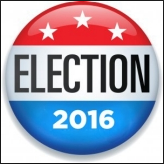 Submitted by Andrea Perrault
Submitted by Andrea Perrault
The usual excitement of a presidential campaign has been eclipsed in 2016 by its seeming interminable length, its raucousness, and general meanness. Clearly, systemic change is needed in our political system: extremely long campaign cycles, primaries in states that are not reflective of the broader U.S. population, constant money raising, and arcane policies
In addition, the inability of the media to provide useful information or analysis on policy issues, preferring instead to report only on candidates’ diatribes toward one another, has made this political season seem unpleasant and ineffective in building a more educated electorate. The overriding emotion arising from this reality appears to be hatred. The verbal invective of some candidates has fed into corresponding distrust, distaste, and anger in the population. Collaboration, conciliation, and cooperation within the parties have vanished.
A central question arising from our present state of politics is this: How did we get here? Politics often, like many other fields, keeps those involved in it in a bubble, completely oblivious to those who are not in the business of it. Politicians are often guided and guarded by “handlers” whose jobs require that they keep the candidates focused on only one task – winning. And the politicians and the handlers seem to live for the fight to win – through long campaigns and lots of money. This year, their single-minded focus blinded them to the interests of the larger population. But change happened.
Cultural change usually takes a long time to occur, and during the two-term Bush presidency, the U.S. seemed to go backward in time as we became mired in useless foreign wars and economic instability. But with the Obama presidency, we appeared to get the change that many wanted to see — a President who seemed to think he could make change happen at a faster rate (wasn’t that indeed the reason he won the Nobel Peace Prize before he had governed?). Since his re-election, many have criticized Obama for failing to get anything done with an obstinate and mean Congress. He had to rely on executive orders to make the changes he wanted to see and to assure any progressive legacy. But a most important change that he represents is that he opened the door to political power to “others”. This opening was an often unspoken consequence. Perhaps it should have been expected that in the 2016 presidential race, “others” — the non-white, non-male, and non-political would step up to the plate, looking to follow his lead.
Obama is a legal scholar, an impassioned speaker, and a keen student of national and international affairs. He was very young Senator from Illinois when he sought the presidency. His ascent to the office empowered others to want to achieve the same goal: Marco Rubio and Ted Cruz were young, Hispanic Senators wanting to bring their heritage to prominence as Barak Obama had brought his. Ben Carson and Carly Fiorina saw the door to political power opening for them, too. Indeed, seventeen candidates on the Republican side were jockeying for position. But they all were not accomplished community organizers, nor as politically astute as Obama. Plus, among the many competitors was a “huge” (non-Republican?) opponent – Donald Trump. Donald Trump was an unexpected “other” who had mastered marketing and media techniques — a businessman with a showman’s swagger and a media presence that all Americans knew. He certainly changed the political scene; the sixteen GOP rivals were not up to the task of beating his strategy of mowing them down with invective and insults. And to the astonishment of many, he is the Republican nominee. Was he inevitable?
The Democrats also benefited from opening doors to “otherness”. Hillary Clinton had been pounding on the glass ceiling for decades. Would America ever elect a woman for President? A different kind of “otherness” interrupted her pursuit of power. A non-Democrat, independent Bernie Sanders, captured the imagination of a population that was frustrated by politics as usual. The “Feel the Bern” movement exploded onto the scene with an intensity that rivaled that of the Trump followers. In a hard fought race, Hillary Clinton is the Democratic nominee — Bernie Sanders will stay independent, and work to elect Clinton and continue to advocate for the changes his movement had sought.
As the race begins with the two nominees, many are concerned that this is so not the change we wanted. Insults and invective are still Trump’s stock in trade, in spite of his constantly changing campaign staff’s efforts to calm the waters. And on the Democratic side, the past haunts Hillary Clinton, from the economic legacy of Bill Clinton to the present questions about the Clinton Foundation and the ever-present e-mail controversy. These realities may fuel the campaigns of the Libertarian and Green parties.
In the long run, the 2016 Presidential election has “opened doors” for new voices to political power. This should be a good thing. Hopefully, if the public stays active and engaged in making change, we will see shorter campaigns with less divisiveness, more inclusion, and less emphasis on money in our political system. This vision won’t happen without a fully mobilized electorate; people need to be active in making the changes that they want to see, or the political and media machines will still dominate. However, if we can succeed, the Obama legacy will be a positive one.